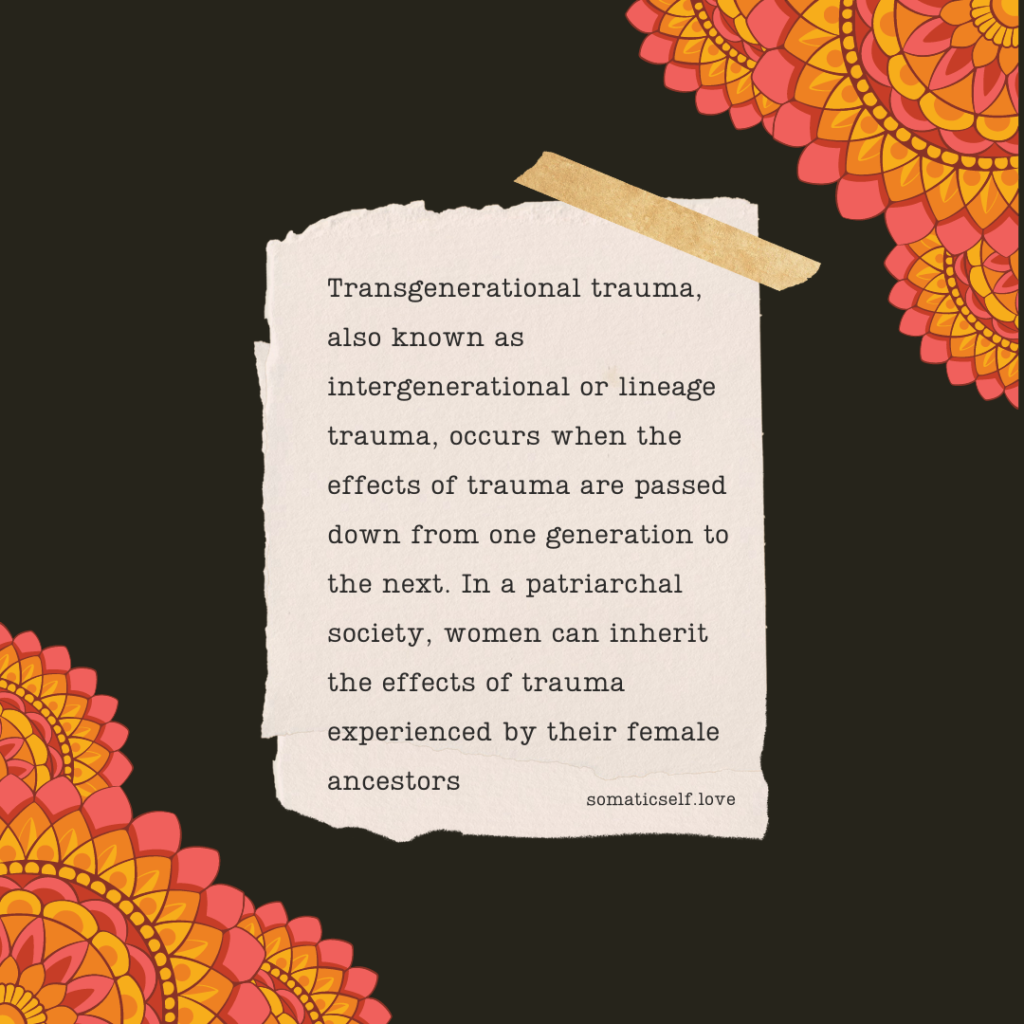Social, Somatic, Transgenerational, Ancestral Trauma for Fem/mes in the Patrairchy

Social trauma, somatic trauma, and transgenerational trauma can have significant impacts on women living in a patriarchal society. Patriarchy, a system in which men hold the majority of power and women are often marginalized or oppressed, can contribute to various forms of trauma for women. Here’s how each type of trauma can affect women in the context of patriarchy:
1. Social Trauma:
Social trauma refers to traumatic experiences that result from structural inequalities, discrimination, or violence within a society. In a patriarchal society, women may experience social trauma in several ways:
- Gender-based violence: Women are more likely to experience various forms of gender-based violence, such as sexual assault, domestic violence, and harassment. These traumatic experiences can have long-lasting physical and psychological consequences for women.
- Discrimination and sexism: Women may face discrimination and sexism in various aspects of their lives, including the workplace, education, and healthcare. These experiences can contribute to feelings of powerlessness, low self-worth, and a diminished sense of agency.
- Objectification and body shaming: The objectification of women’s bodies in the media and society can lead to internalized self-objectification and body shame, which can negatively affect mental health and self-esteem.
2. Somatic Trauma:
Somatic trauma refers to the way in which the body stores and processes traumatic experiences. In a patriarchal society, women may experience somatic trauma as a result of the following:
- Internalized oppression: The chronic stress and tension resulting from living in an oppressive environment can become stored in the body, leading to physiological changes and physical symptoms, such as chronic pain, fatigue, or gastrointestinal issues.
- Disconnection from the body: Women may learn to dissociate from their bodies as a coping mechanism to deal with trauma, objectification, and societal expectations. This disconnection can hinder their ability to recognize and address the physical manifestations of trauma.

3. Transgenerational Trauma:
Transgenerational trauma, also known as intergenerational or lineage trauma, occurs when the effects of trauma are passed down from one generation to the next. In a patriarchal society, women can inherit the effects of trauma experienced by their female ancestors, such as:
- Internalized gender roles: Women may inherit and internalize limiting beliefs, behaviors, and coping mechanisms related to gender roles and expectations, which can contribute to their own experiences of oppression and marginalization.
- Epigenetic inheritance: There is evidence to suggest that trauma can lead to changes in gene expression that can be passed down through generations. This means that women may inherit a biological predisposition to certain mental health issues or stress responses due to the trauma experienced by their ancestors in a patriarchal society.
In summary, social trauma, somatic trauma, and transgenerational trauma can deeply impact women living in a patriarchal society. Addressing these forms of trauma requires challenging and dismantling patriarchal systems and beliefs, as well as providing support and resources for healing and empowerment.
Related Research
Here are some research studies and articles that discuss transgenerational trauma, intergenerational trauma, and the potential inheritance of trauma experienced by female ancestors in patriarchal societies:
- Yehuda, R., & Bierer, L. M. (2009). The relevance of epigenetics to PTSD: Implications for the DSM-V. Journal of Traumatic Stress, 22(5), 427-434. LinkThis study explores the epigenetic basis of PTSD, which is relevant to the inheritance of trauma across generations.
- Kellermann, N. P. (2001). Transmission of Holocaust trauma: An integrative view. Psychiatry: Interpersonal and Biological Processes, 64(3), 256-267. LinkAlthough this study focuses on Holocaust survivors, it provides a comprehensive understanding of how trauma can be transmitted across generations.
- Guralnik, O. (2019). Intergenerational transmission of trauma: The complex interplay of genetics, epigenetics, and social factors. In The Palgrave Handbook of Sociocultural Perspectives on Global Mental Health (pp. 343-363). Palgrave Macmillan, London. LinkThis chapter discusses the various elements that contribute to the transmission of trauma, including genetics, epigenetics, and social factors.
- Danieli, Y., Norris, F. H., & Engdahl, B. (2017). A question of who, not if: Psychological disorders in Holocaust survivors’ children. Psychological Trauma: Theory, Research, Practice, and Policy, 9(1), 98-106. LinkThis study examines the prevalence of psychological disorders in the children of Holocaust survivors, highlighting the potential inheritance of trauma.
- Lehrner, A., & Yehuda, R. (2018). Trauma across generations and paths to adaptation and resilience. Psychological Trauma: Theory, Research, Practice, and Policy, 10(1), 22-29. LinkThis review article discusses the intergenerational transmission of trauma and factors that contribute to resilience and adaptation.
While these studies may not be specifically focused on the inheritance of trauma experienced by female ancestors in patriarchal societies, they provide valuable insights into the concept of intergenerational trauma. Further research is needed to explore how gender and patriarchal structures influence the transmission of trauma across generations.